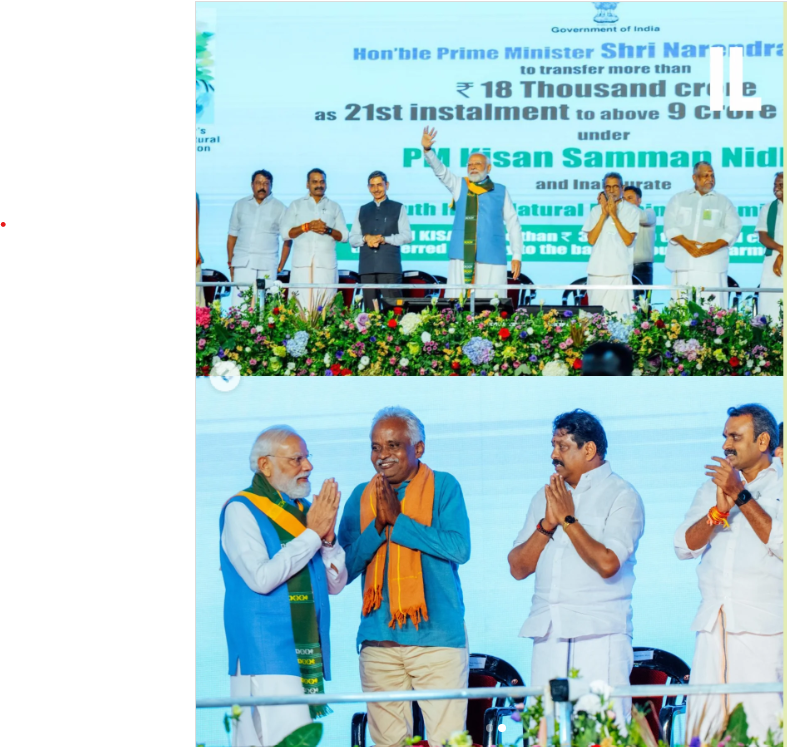Friday, 20 February 2026

PM releases 21st PM-KISAN Instalment of ₹18,000 Crore for 9 Crore Farmers
Prime Minister Shri Narendra Modi inaugurated the South India Natural Farming Summit 2025 at Coimbatore, Tamil Nadu on 19 Nov.
The Prime Minister stated that in the coming years, he envisions major transformations in Indian agriculture. “India is on the path to becoming a global hub for natural farming”, affirmed Shri Modi, noting that the country’s biodiversity is evolving, and the youth are now viewing agriculture as a modern, scalable opportunity. This shift, he said, will greatly strengthen the rural economy.
India’s agricultural sector has undergone significant change, exports of agricultural products have more than doubled, and opened new avenue to support farmers in modernising agriculture. Underscoring that through the Kisan Credit Card (KCC) scheme alone, farmers have received assistance exceeding ₹10 lakh crore this year, Shri Modi noted that since the extension of KCC benefits to livestock and fisheries sectors seven years ago, those engaged in these areas have also been availing its advantages extensively. He added that the reduction in GST on bio-fertilizers has further benefited farmers.
The Prime Minister unleshed the 21st installment of the PM-Kisan Samman Nidhi, transferring ₹18,000 crore to farmers across the country. The Prime Minister highlighted that under this scheme, ₹4 lakh crore has been directly transferred to the bank accounts of small farmers so far, enabling them to meet various agricultural needs.
The 21st-century agricultural landscape demands a shift towards natural farming, as highlighted by Prime Minister Shri Narendra Modi during the South India Natural Farming Summit 2025 in Coimbatore. He noted that excessive reliance on chemical fertilisers and pesticides is depleting soil fertility, reducing moisture, and escalating farming costs. Emphasising crop diversification and natural farming as solutions, the Prime Minister underscored their role in strengthening the rural economy. India’s agricultural sector is evolving, with exports doubling and initiatives like the Kisan Credit Card (KCC) scheme providing over ₹10 lakh crore in assistance this year. The scheme’s extension to livestock and fisheries, along with reduced GST on bio-fertilisers, has further supported farmers. The Prime Minister also launched the 21st PM-Kisan Samman Nidhi installment, transferring ₹18,000 crore to farmers nationwide, bringing the total disbursement under this scheme to ₹4 lakh crore.
Prime Minister Shri Narendra Modi emphasized that natural farming is essential to reviving soil fertility, enhancing crop nutrition, and preserving biodiversity for future generations. Addressing the South India Natural Farming Summit 2025 in Coimbatore, he highlighted that natural farming mitigates climate change, maintains soil health, and shields people from harmful chemicals. This approach aligns with India’s vision of becoming a global hub for natural farming, strengthening the rural economy, and modernizing agriculture.
The Government of India encourages farmers to adopt natural farming. The government has launched the National Mission on Natural Farming, which has connected lakhs of farmers. He highlighted that the positive impact of this initiative is especially visible across South India, with approximately 35,000 hectares of land in Tamil Nadu alone now under organic and natural farming. South India is consistently adopting traditional and natural farming practices such as Panchagavya, Jeevamrit, Beejamrit, and mulching. These practices improve soil health, keep crops chemical-free, and reduce input costs.
Prime Minister emphasized the importance of promoting multi-crop agriculture over monoculture, citing South India as an inspiration. He highlighted the multi-storey agricultural practices in Kerala and Karnataka, where diverse crops like coconut, areca nut, and fruit plants are grown alongside spices like black pepper. This integrated approach on small plots reflects the essence of natural farming. The Prime Minister called for expanding this model nationwide and urged state governments to adopt such practices across their regions. The Prime Minister highlighted the government’s commitment to promoting natural and chemical-free farming to expand the global reach of Indian superfoods. He called for discussions on these efforts at the South India Natural Farming Summit 2025, emphasizing their role in strengthening international markets.
India has played a vital role in promoting natural farming through Farmer Producer Organisations (FPOs). Over the past few years, 10,000 FPOs have been established, enabling small farmer clusters to access facilities for cleaning, packaging, and processing, and to connect directly to online markets like e-NAM. This collaboration of traditional knowledge, scientific expertise, and government support is essential for enhancing farmer prosperity and ensuring environmental health.